Seven Oil Exploration and Production Investments to Purchase For Fueling Income Amid War 04/29/2022 | | | An oncology company, a leading franchising company, a biopharma company, and two more microcap stocks could see a spike in share prices... All due to an earnings announcement coming real soon. Now's your chance to see the opportunity provided by these 5 microcap stocks.
Click here to get the names & ticker symbols of all 5. Click Here... | | | | Seven oil exploration and production investments to purchase for fueling income amid the war started by Russia's President Vladimir Putin against the people of neighboring Ukraine give investors a way to profit from rising energy prices despite the market's recent pullback.
The contrarian approach to investing involves strategically choosing the right stocks and funds that are devoted to exploration and production (E&P). The seven oil exploration and production investments to purchase feature three funds and four stocks that are positioned to rise despite Putin's peril-filled policies to attack Ukrainians, whether they are women, children or the elderly, aside from men between the ages of 18 and 60 who have been called upon to defend their country from Russian invaders.
E&P companies are engaged in the early stage of energy production known as the upstream segment of the business. Such E&P entails searching for and extracting oil and gas from the ground. Typically, E&P companies do not refine or produce energy, but instead try to find and extract raw materials.
Share Price Pulls Back for Seven Oil Exploration and Production Investments to Purchase
Despite a run-up in energy prices early in 2022 that lifted industry stocks and funds, the sector has pulled back in the last couple of weeks as new COVID-19 lockdowns take place in China, governments in many countries start to raise interest rates to fight inflation and demand for oil has weakened. Plus, supply has been limited by government policies in the United States and elsewhere that are opposed to fossil fuels and geopolitical events that include Russia shelling Ukrainian oil refineries and even nuclear power plants.
BofA Global Research monitors private U.S. E&P companies closely and forecasts their rig activity will top pre-COVID levels, while public U.S. E&Ps are expected to slide 45% below pre-COVID levels. While public E&Ps will raise their activities modestly above maintenance, probably producing 20%-plus year over year (y/y) growth in the group's capital expenditures (capex), private E&Ps should provide the biggest increases in 2022.
For example, BofA expects private E&P capex to surge by roughly 55% in 2022. Overall, U.S. E&P capex is projected by BofA to rise 37% this year, including roughly 10% due to inflation.
Clean Energy Fund Gains Place Among Seven Oil Exploration and Production Investments to Purchase
President Biden's recent proposal to support clean energy underscores the value of several recommendations of Bob Carlson, a pension fund chairman who also heads the Retirement Watch investment newsletter.
Carlson recommended broad-based commodities investments that he said should do well at this time. One is the iShares GSCI Commodity Dynamic Roll Strategy ETF (NASDAQ GM: COMT). That ETF seeks to track the investment results of an index composed of a wide range of commodity stocks.
The fund gives investors access to commodities across energy, metals, agriculture and livestock sectors through a rules-based futures strategy aimed at minimizing costs associated with futures investing. The ETF also simplifies tax filings by not requiring K-1 reporting that investors often dread due to it complicating tax returns. The fund further uses a diverse commodities portfolio to help protect against inflation.
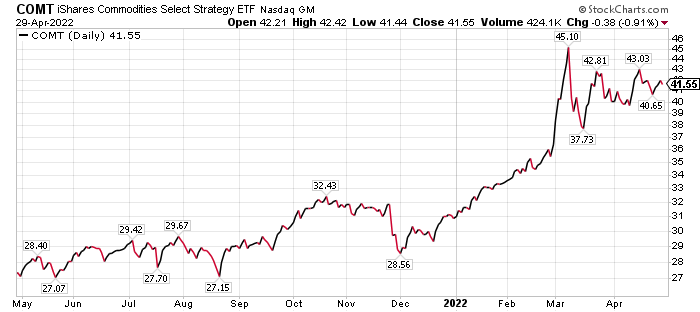
Chart courtesy of www.stockcharts.com
COMT rose -0.07% in the past week and slid 3.99% in the last month, but climbed 25.61% in the past three months, 35.78% so far in 2022 and 54.31% in the past 12 months.
Seven Oil Exploration and Production Investments to Purchase Can Provide Income Despite Inflation
"The energy sector in general and oil-related investments, in particular, are overbought at this point because of the surge so far this year," said Carlson, chairman of the Board of Trustees of Virginia's Fairfax County Employees' Retirement System with more than $4 billion in assets. "Investors are worried that tightening by the Federal Reserve and slower growth in China due to surging COVID-19 cases will reduce global growth and therefore demand for energy."
However, a sharp decline in economic growth is unlikely, continued Carlson. The Fed has barely begun to combat inflation, and the economy still has significant upward momentum, he added.
In addition, China is going to do whatever it takes to maintain economic growth, Carlson counseled. China's real gross domestic product (GDP), measuring growth after accounting for inflation, reached 8.1% in 2021, after nearly averaging 10% since 1978, even though the World Bank expects just 5.0% in 2022.

Bob Carlson, head of Retirement Watch, talks to author Paul Dykewicz.
XLE Earns Slot Among Seven Oil Exploration and Production Investments to Purchase
"My top pick remains the ETF Energy Select Sector SPDR (XLE)," Carlson told me. "It tracks the S&P 500 energy sector, which is the top-performing sector in the S&P 500 in 2022 after years of underperforming the rest of the index."
The ETF holds 21 stocks and three other types of investments. About 76% of the fund is in its 10 largest positions. Exxon Mobil (NYSE: XOM) was almost 23% of the fund, and Chevron (NYSE: CHX) was just over 21% of the fund. Other top holdings were EOG Resources (NYSE: EOG), Schlumberger NV (NYSE: SLB) and Conoco Phillips (NYSE: COP).
The fund is a diversified energy investment that holds a portfolio of refiners, E&P stocks, as well as diversified companies engaged in two or more activities. XLE is up 69.09% in the last 12 months, 38.56% for the year to date, 23.14% in the past three months but only 0.83% in the prior four weeks. The slight gain in the past month shows the fund has become overbought and its appreciation will slow for a while, Carlson cautioned.
"As long as economic growth remains solid, demand will exceed supply and support high prices for energy products," Carlson said.
Even though companies are working to increase production, it takes a "long time" to do so with new sources or to restore old ones that have been shut down, Carlson said.
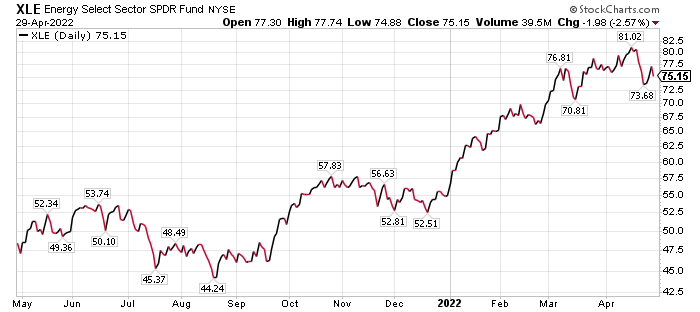
Chart courtesy of www.stockcharts.com | | | Imagine being able to outperform the market by 6X every single year.
Now imagine accomplishing that, without spending a lick of time studying charts, or doing any kind of stock market analysis.
Sounds like a pipe dream, right?
Yet, hundreds of investors have been using a little-known strategy to collect annual stock market gains of 63% over the last 3 years – without doing any real work…
And you can, too.
Click here to discover how. Click Here... | | | | MLOAX Joins Seven Oil Exploration and Production Investments to Purchase
A more aggressive fund to consider is Cohen & Steers MLP & Energy Opportunity (MLOAX), Carlson commented. The fund looks for companies in exploration, production, gathering, transportation, processing, storage, refining, distribution, or marketing of oil, natural gas and other energy sources.
For example, the fund's largest holding is Enbridge Inc. (NYSE: ENB), which has an extensive pipeline network through which it transports natural gas and other energy products. The fund's second-largest holding is Cheniere Energy Inc. (NYSEAMERICAN: LNG), which focuses on liquefied natural gas (LNG) exports. Other top holdings are the Williams Companies (NYSE: WMB), TC Energy (NYSE: TRP) and Energy Transfer LP (NYSE: ET).
The fund has 56 positions, with 55% of the fund in the 10 largest positions. MLOAX is up almost 40% in the past 12 months and more than 20% for the year to date. It also has climbed 4.83% in the last four weeks.
As an open-ended mutual fund with several share classes, investors should determine which share class has the lowest cost by inquiring with their brokers.
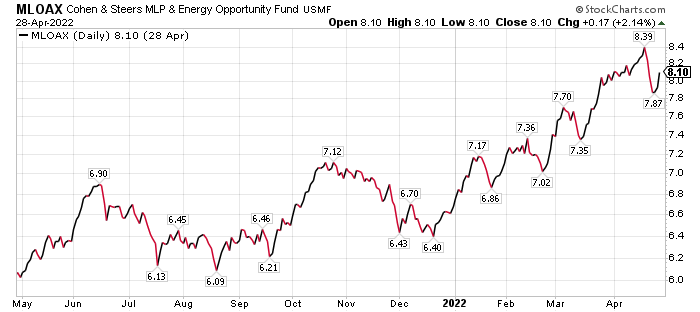
Chart courtesy of www.stockcharts.com
Exxon Mobil Motors onto Seven Oil Exploration and Production Investments to Purchase
Exxon Mobil Corp. (NYSE: XOM) is recommended by BofA Global Research and two investment prognosticators, including Bryan Perry, who heads the Cash Machine investment newsletter, as well as the Premium Income, Quick Income Trader, Hi-Tech Trader and Breakout Options Alert advisory services. Perry has had a good track record of producing winning trades with energy stocks.
The other investment professional who told me she especially likes XOM is Michelle Connell, a former portfolio manager who now serves as president of Dallas-based Portia Capital Management.

Michelle Connell, CEO, Portia Capital Management
The stock has retreated 6.23% in the past week and 3.42% in the last month but jumped 12.13% in the last three months and 54.08% in the past year. It also pays a modest dividend.
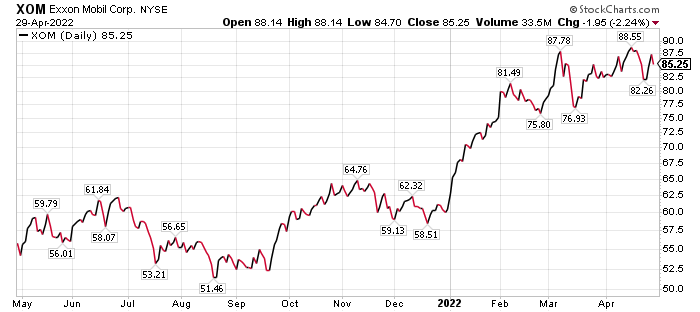
Chart courtesy of www.stockcharts.com
BofA has given XOM a price objective of $120 per share, based on $70 Brent and $66.50 WTI long-term prices. The investment firm is using a weighted average cost of capital (WACC) for XOM of 7%, based on the BofA strategy team's risk premium and a 2-year weekly beta.
Risk to BofA's price objective include 1) the oil and gas price and margin environment, 2) significant delays to the new upstream projects critical to XOM's growth targets, and 3) any inability to capture the price environment due to cost pressures from operating expenses, capital expenditures and taxation. Upside risks to the price objective are higher oil & gas prices.
Hess Holds Place Among Seven Oil Exploration and Production Investments to Purchase
BofA set a price objective of $180 per share on Hess Corp., assuming $70 Brent and $66.50 WTI long-term oil prices. The investment firm also applied a WACC of 6.5%, based on the BofA strategy team's assumed risk premium and a 2-year weekly beta.
The risks to its price objective are the same as with Exxon Mobil, except that the news flow around HES' exploratory and appraisal drilling activities could hurt the stock. Upside risks to the price objective are higher oil and gas prices.
Hess slipped 11.28% in the past week and 6.97% in the last month but rose 17.65% in the past three months and 50.56% in the previous 12 months.
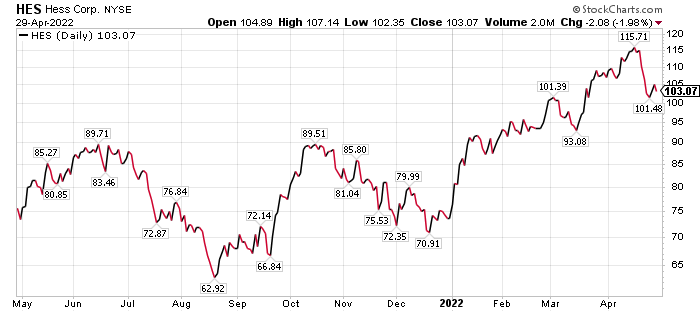
Chart courtesy of www.stockcharts.com | | | The market is a rollercoaster right now. People are desperately searching for more security in their trades and investments -- to feel some sense of reassurance that future wealth is still within their grasp. But where can they find it?
In the tools built for volatile markets. If you haven't applied A.I. to your trading yet, now is the time to really consider it. See a Live Demo today for free. Click Here... | | | | APA Added to Seven Oil Exploration and Production Investments to Purchase
BofA put a $65 price objective on APA Corporation (NASDAQ: APA), assuming the same oil prices as it did for XOM and HES, while applying the same WACC, risk premium and 2-year weekly beta. Potential ways to outperform the BofA price target for APA include 1) higher commodity prices, 2) exploration success in Suriname and 3) exploration success and increased drilling activity in Egypt.
On the other hand, those potential strengths may not be manifested. The risks to achieving the BofA price objective are 1) lower commodity prices, 2) Egyptian political risk and 3) exploration risk in Suriname.
APA fell 12.72% in the past week and 6.71% in the last month, while jumping 17.02% in the past three months and 108.89% in the last 12 months.
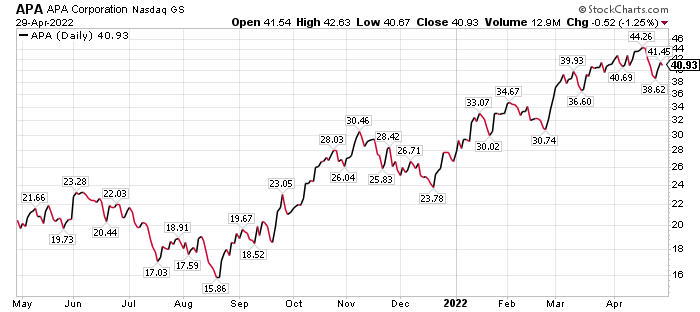
Chart courtesy of www.stockcharts.com
Suncor Energy Lands on List of Seven Oil Exploration and Production Investments to Purchase
Suncor Energy (NYSE: SU) received a BofA price objective of $47 US and $60 CN, based on a $70 Brent and $66.50 WTI long-term prices. BofA assumed long-term HH natural gas of $3.50, as it did for the other stocks.
The investment firm also used a WACC of 6.7%, following the capital asset pricing model and using a weighted average cost of historical debt, along with a 2-year weekly beta.
Downside pressures on the price target for SU are 1) oil price risk, 2) deterioration in refining margins, 3) interruption of production at units related to operational issues, fires, etc. 4) tax policy in the regions in which it operates and 5) a lack of generalist investor interest.
SU slid 8.76% for the past week and 8.19% for the last month, while jumping 14.42% for the last three months and 58.37% for the past year.
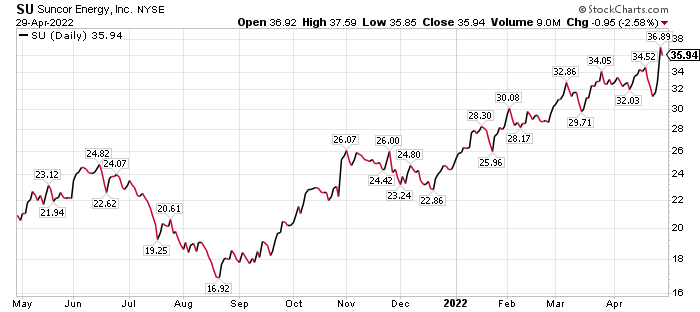
Chart courtesy of www.stockcharts.com
Woods' Market-Timing Strategy Offered Through 'Successful Investing' Signals
The NASDAQ Composite now is officially in bear market territory. Year to date through April 29, the tech-heavy index is down 24.81%, with much of that selling taking place in the final two weeks of April, said Jim Woods, who heads the Successful Investing and Intelligence Report investment newsletters, as well as the Bullseye Stock Trader and High Velocity Options trading services.
Technically speaking, all four of the major domestic averages, the Dow Industrials, S&P 500, Nasdaq Composite and Russell 2000, continue to suggest that the dominant trend going forward is bearish, with all four of those indices now trading below their respective 50-day and 200-day moving averages, Woods wrote to his Successful Investing subscribers. The latest data show inflation surging to record highs, as producer prices soared 11.2% year over year to multi-decade highs. If price hikes continue, Woods predicted that the Fed will be forced to become as aggressive as possible in battling inflation.
His Successful Investing newsletter uses a plan to signal when to invest in the market and when to step away. On Jan. 21, those subscribers received a Domestic Fund Composite (DFC) and an International Fund Composite (DFC) "Sell" signal to wait out the market storm calmly. While the numbers dictate a current abstention from broad-based equities, Woods added he thinks that stocks could see a substantive rebound.
For that rebound to take place, a confluence of positives would be needed, such as a less hawkish Fed, a very strong corporate earnings season, a ceasefire or a peace agreement to end Russia's attack against Ukraine and reduced inflation, Woods advised.

Paul Dykewicz meets with Jim Woods, head of the Successful Investing and Intelligence Report investment newsletters.
Russia's unrelenting war against Ukraine is keeping the pressure on oil prices. Russian President Vladimir Putin has all but squelched any chances of a diplomatic solution to the conflict, Woods added.
The civilian atrocities Putin-led forces reportedly have inflicted upon the Ukrainian people have not only caused world leaders such as President Biden of the United States, Prime Minister Boris Johnson of the United Kingdom and France's President Emmanuel Macron to call Putin a war criminal but to express the need for a formal prosecution.
Leaders in France, Germany, Italy, Greece, the Czech Republic and Poland expressed outrage at images of Ukrainian civilians tortured and killed. Czech Prime Minister Petr Fiala called the images "horrifying" and joined in calling the actions war crimes. Germany's Chancellor Olaf Scholz added that international organizations should receive access to the areas where atrocities are reported to have occurred to document them independently.
COVID-19 Infects More than Half Americans, Fueling Further Economic Concern
The latest COVID-19 news from the U.S. Centers for Disease Control and Prevention (CDC) found that more than half the people in America, including most children, now have been infected with the coronavirus. In China, lockdowns have affected at least 373 million people, including roughly 40% of the country's gross domestic product (GDP). A key effect is continued disruption of the world's supply chain for many products.
Most of Shanghai's 25 million residents still remain in lockdown, as the Chinese military and additional health workers have been dispatched there to aid in the response. Home to the world's largest port, Shanghai has struggled to unload cargo due to strict regulations that have caused shipping containers to stack up. Some frustrated Shanghai residents have taken videos that went viral to show people screaming from high-rise buildings about the need for food and the government is attempting to crack down on the posting of such real-world frustration.
Also in China, young children with COVID-19 have been separated forcibly from their parents, fueling public dissent, as Chinese leaders seek to stop the spread of a new, highly contagious subvariant of Omicron, BA.2. The variant also is causing a new wave of infections in European nations such as Germany, the Netherlands and Switzerland.
COVID-19 Booster Shots in America Top 1 Million, Deaths Approach 1 Million
COVID-19 deaths worldwide exceeded 6.2 million to total 6,233,628 on April 29, according to Johns Hopkins University. Cases across the globe have jumped to 512,935,802.
U.S. COVID-19 cases, as of April 29, hit 81,320,794, with deaths rising to 993,571. America has the dubious distinction as the country with the most COVID-19 cases and deaths.
As of April 29, 257,565,087 people, or 77.6% of the U.S. population, have obtained at least one dose of a COVID-19 vaccine, the CDC reported. Fully vaccinated people total 219,610,128, or 66.1%, of the U.S. population, according to the CDC. America also has reached another key milestone by giving a COVID-19 booster vaccine to 100 million people.
The seven oil exploration and production investments to buy show that fossil fuels continue to have a key role in sustaining economic growth and employment, as well as providing a return to their investors. Those seeking to be rewarded for taking additional risk by investing in the market soon may be rewarded if some potentially positive developments begin to occur. | | | Sincerely,

Paul Dykewicz, Editor
DividendInvestor.com
| | About Paul Dykewicz: Paul Dykewicz is an accomplished, award-winning journalist who has written for Dow Jones, the Wall Street Journal, Investor’s Business Daily, USA Today, Seeking Alpha, GuruFocus and other publications and websites. Paul is the editor of StockInvestor.com and DividendInvestor.com, a writer for both websites and a columnist. He further is the editorial director of Eagle Financial Publications in Washington, D.C., where he edits monthly investment newsletters, time-sensitive trading alerts, free e-letters and other investment reports. Paul also is the author of an inspirational book, "Holy Smokes! Golden Guidance from Notre Dame's Championship Chaplain", with a foreword by former national championship-winning football coach Lou Holtz. Follow Paul on Twitter @PaulDykewicz. | | | | | |
Tidak ada komentar:
Posting Komentar